Kelli Russell Agodon's Blog
May 28, 2024
Wonderful Interview with Leah Umansky and her new book, OF TYRANT


Interview with Leah Umansky: Looking for Moments of Goodness—Start Noticing
TSP: Congratulations on your upcoming poetry collection, Of Tyrant, in which you have a skilled and beautiful way of playing with space, employing the use of repetition which sometimes resembles litanies, and mixing the political with the personal.
As readers, at times we feel drawn into the rage and the darkness of the content, but then you gift us with so much beauty and hope as you write, "oyster our way out of hate." We are curious if you were working on writing these two threads simultaneously or if those moments of noticing "it's good to be alive" and that "every one of us is important" were revelations you found in your exploration of the tyrant/monster. Could you speak to that process, and also, what would you say to our readers who might want to write about current political issues or global crises?
LU: Thank you so much. I really enjoy juxtaposition, to be honest, and I really enjoy playing with language. It’s what makes writing fun for me—that idea that you can do anything, that you can make nouns, verbs, and verbs, nouns, etc.
Finding hope is about looking and it’s about manifesting. It’s easy to wallow and easy to be depressed; it’s hard to hold on to things and be hopeful. That’s something I work at. I wouldn’t say I’m always good at it, but in the age of the tyrant, which sadly we’re still living through, the only way I was able to cope with his tyranny, his spread of hatred, his stupidity was in aligning myself with the good in the world and reaching for that silver lining.
That line, “oyster our way out of hate,” made me think of the beautiful sheen of an oyster, and the darkness of hate—that contrast—but honestly, I loved the sound of “oyster” as a verb.
Many of the poems in Of Tyrant are written as a sort of a love poem to the world and a love poem to the self. How do we survive during hard times? We love ourselves and we love others. Again, we look for moments because there is goodness; it just isn’t always tangible. Sometimes, when things get us down, we have to turn to the light and remember we are lucky.
When I was first writing these poems, I was single. Dating had been a nightmare and I had been trying unsuccessfully for over ten years. To make things worst, we basically had a dictator as a president and his hatred was everywhere. I had to stop watching the news, but then I’d go on social media and see his evil, I’d go to work and here people talking about him in the faculty room, and ultimately there was no escape. So, for the first time in my life, I had no choice but to write about it.
It took me many years, probably into my 30’s to realize that all poetry is political. All art is political. My first book of poems, Domestic Uncertainties (Blazevox, 2012), is a book about my marriage and divorce—at that time, I said oh, right, so feminism is political—but these poems in Of Tyrant, take that feminism and steep it in democracy. Obviously, the two are related.
Every one of us is important and that’s what I used to steer me forward. I wrote that poem, in Chicago when I was on a book tour for my previous book of poems, The Barbarous Century. I was already putting together this new book, and was having a hard time dealing with the news, and with dating, and when I stopped and paid attention around me, I saw the beauty. That Lyft driver, Mario, made me have that realization. I wrote it down. It entered a poem.
My advice would be—start noticing. It’s not anything earth-shattering, and I cringe at what I’m about to say here, but make a text thread to yourself. It’s sometimes a bit more immediate than writing in a notebook or on paper. When I have a moment of noticing, I text myself and when I sit down to write, that’s how poems come. My advice is—don’t question it.
You know what they say, the only way out is through. Facing the worry, the angst, the despair not only helps you, but helps others. All art is for everyone. There’s a line in the book, “. . .the biggest iris is you.” The iris is what lets light into your eye. This book is very much about tyranny but also about letting the light in and holding it.
TSP: Part of what makes this collection so dynamic is the way you play with form, with some poems consisting of one or a few word lines, others in boxy prose containers, some with extra spacing between words or letters, and some individual poems that are a combination of these forms. We'd love to hear your thoughts and process on how these forms and the content shaped each other as you crafted this collection.
LU: I appreciate this. Honestly, I’m a fast writer. I tend to know relatively soon if something is working or not working and I’ve said this before in interviews, but I think my fingers move faster than my mind—I’m a fast typist.
I try to follow my gut and follow my instincts with my poems. Some of the poems, like let’s say, “Burn,” just spewed out of me. There’s no other way to say it. I knew the lines would be short because I wanted that intensity. I wanted the dynamics of having one word lines, so your eye quickly moves down the page, and when the poem is read aloud, I desired urgency. Why? Because the tyrant desires urgency—all the tyrants, political, professional, or personal. That’s what makes them tyrannical, right? Their hunger.
I also love playing with space and both margins. When I spread out letters in a word, again it’s instinctual, but it’s also my fingers moving fast on the space bar. It’s also a note for the reader to s l o w d o w n and take a minute.
I love what you said about the prose sections as containers. I love a prose poem. It’s probably my favorite poetic form for the magic within its constraints. For me, a prose poem is about the layering of images, and or language. Repetition is a powerful device and I love it. They say repetition can be a sign of being unhinged, but in writing, it’s that freedom, that throwing off of caution that I love and cling to.
Also, the prose container of a prose poem can be a placeholder, it can be a scene or stage setting and I love that.
I’m also an artist—I’ve designed all of the collages of my book covers, and so I think there is something very visually pleasing about a prose poem, as well as, the poems that use the whole margin.
Additionally, as a woman, why not un-marginalize our voice? Why not use up that whole page?
Why not!
_______
OF TYRANT is about living under the eye of the tyrant. The tyrant, in his many forms, devastates our democracy and our truths, and in doing so, he also infringes on what is precious in our humanity, the heart. Poems from the book have been published in such places as, Poets.org “Poem-a-Day,” Minyan Magazine, The American Poetry Review, The Missouri Review, and The Cincinnati Review, among others. Not only is it a book about democracy and tyranny but also about womanhood and hope.
What does it mean to live in a country at war with itself—historically, spiritually, politically? Where does this sickness originate? In poems both personal and sweeping in scope, Umansky opens the door to all the possible answers, pointing outward but also in, to the twists and turns of our collective psyche. Read this book if you are brave, if you plan to vote in 2024, if our future frightens you, if you love this world we live in.
Best link(s) to purchase Leah’s books: WordWork Books or Bookshop.org
Links to connect with Leah: Leah’s Website, Facebook, Twitter, Instagram
BIO: Leah Umansky is an educator, curator, collagist and writer in New York City. She is the author of three books of poetry, most recently, Of Tyrant, (Word Works Books) and two chapbooks, Straight Away the Emptied World and the Mad-Men inspired Don Dreams and I Dream. Umansky earned her MFA in Poetry at Sarah Lawrence College and has curated and hosted The COUPLET Reading Series in NYC since 2011. Her creative work can be found in The New York Times, The Academy of American Poets’ Poem-A-Day, USA Today, POETRY, and American Poetry Review. She has taught workshops to writers of all ages in such places as The Poetry School (UK), Hudson Valley Writers Center, and Memorial Sloan Kettering’s Visible Ink Program. She can be found at http://www.leahumansky.com
*****
Kelli Russell Agodonwww.facebook.com/agodonwww.twit...
January 1, 2023
Interview with Suzanne Frischkorn from Two Sylvias' Weekly Muse:
Every other week at Two Sylvias Press, we do an interview with one of our favorite poets that ends up in the Weekly Muse (a new tool we created to help poets stay in touch, write over 100 poems in a year, find new places to submit, and more!)
Our January 1st issue featured Suzanne Frischkorn whose new book FIXED STAR is now out!
And if you want to know more about The Weekly Muse, check it out here!
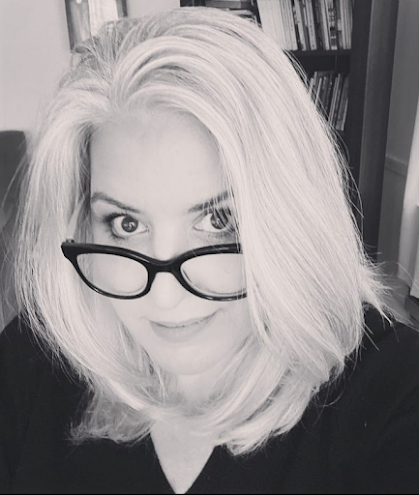
Interview with Suzanne Frischkorn: Showing Up to Write Without Expectations
TSP: Suzanne, we have been fans of your work since your first book, Lit Windowpane (2008), now your new book Fixed Star has JUST been released from Jackleg Press! (Congratulations!) How have your poems or writing process changed since your first book, and in what ways did you stretch yourself in Fixed Star?
SF: That’s so kind of you to say! Thank you so much. It’s very exciting to have a new book out in the world. These are great questions. Both Lit Windowpane, and my second book, Girl on a Bridge—for the most part—are collections of spare, lyric poems. In Fixed Star I wanted to write against that inclination and write longer, lusher poems. You will still find lean poems in this collection, but the two sonnet coronas in this book helped me write longer poems, and something about writing the prose poems lent itself to lushness for me.
The other way this book differs from my two previous collections is that it’s the first book I’ve written with an intent. I knew I wanted to write about my heritage and to do that I had to immerse myself in research. A little background — my father was a Captain in the Cuban Revolution, and my parents met when he was transporting arms for Fidel Castro through the border town of Brownsville, Texas, where my mother lived. Once Castro took power and revealed his true intentions of dictatorship rather than democracy, my parents boarded a plane to the United States, where my father ultimately became a US Citizen. Cuba was rarely spoken of in our home for fear it would upset my father and as a result, I learned very little about my heritage. To write Fixed Star required learning about Cuba’s history, the United States’ history with Cuba, the Cuban Revolution, and The Special Period. In the process, I came across Cuban poets, writers, artists, and musicians. I reconnected with extended family, and I traveled in search of answers. I definitely didn’t have to leave town to write my first two books.
TSP: What do you struggle with most as a poet, and what advice or ideas would you have for other poets who may struggle with this same issue?
SF: I would say perfectionism is something I struggle with periodically. I dread when it happens, but I’ve learned to recognize it for what it is—fear that I won’t remember how to write. It usually shows up when I’ve spent too much time away from my desk, and over the years, I’ve learned to deal with it right away. The longer you avoid the blank page the worse the perfectionism gets, at least, that’s the case for me. Some of the ways I’ve banished it are by writing a certain amount of words a day (100 words on my experience at the grocery store, or 100 words on what I noticed walking the dog etc.), doing some automatic writing, having fun with wordplay, list making, or very basic journaling. The trick is to face the fear of that blank page with no expectations to get back to your desk, or your notebook, or laptop. Essentially to show up. Eventually something changes, and you are writing again.
****
Where you can purchase Fixed Star: Bookshop.org, Barnes & Noble, or Amazon
Author website: https://suzannefrischkorn.com/
Find Suzanne on Facebook.
Follow Suzanne on Twitter or Instagram.
About Suzanne:
Suzanne Frischkorn is a Cuban-American poet. She is the author of Fixed Star (JackLeg Press 2022), Girl on a Bridge, Lit Windowpane, (both from Main Street Rag Press) and five chapbooks. She is the recipient of The Aldrich Poetry Award for her chapbook Spring Tide, selected by Mary Oliver, an Emerging Writers Fellowship from the Writer’s Center for her book Lit Windowpane, and an Individual Artist Fellowship from the Connecticut Commission on Culture & Tourism. She is an editor for $-Poetry is Currency and serves on the Terrain.org editorial board.
~ Kells ________________ www.agodon.com / www.twosylviaspress.comKelli Russell Agodonwww.facebook.com/agodonwww.twit...
October 10, 2022
Skagit River Poetry Festival 2022: The Reboot & What I Learned
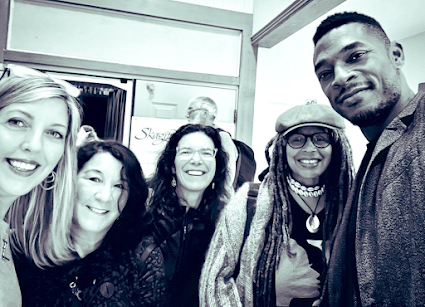 Poets: Me (Kelli Russell Agodon, Susan Rich, Marty Silano, Jourdan Keith, Terrance Hayes) (Jane Hirshfield photobomb over Susan's head!)
Poets: Me (Kelli Russell Agodon, Susan Rich, Marty Silano, Jourdan Keith, Terrance Hayes) (Jane Hirshfield photobomb over Susan's head!) Due to the pandemic, the Skagit River Poetry Festival, like so many other things has been on hold. But since Thursday, I have been in a small town in Washington State allowing poets and poetry to reenter my life.
The Skagit River Poetry Festival has been called the little sister of the Dodge Festival, or perhaps, I just named it that right now, but that's how I think of it. It begins Thursday night with a "Poet Soiree" where locals and patrons of the arts eat dinner with poets (2 per table). What I found were the women at the table who weren't poets were WAY more interesting than I was--so I really enjoyed getting to know them. After the dinner, there was an opening reading then we're off!
What I realized since basically becoming a lazy (though traveling) Emily Dickinson recluse during the pandemic is that human interaction is tiring.
It reminded me that with AWP coming up in Seattle in March, to really take care of ourselves at big events.
So here are a few of my takeaways from the festival:
1) I enjoy poets. This seems silly to say, but being around other people who are doing the same art you are, feels good. You arrive with a knowledge of what the other has gone through or is going through. You have an understanding that you're doing something with so much love, and passion, and also knowing that most likely, not a huge amount of people will read what you write, and yet, you still do the thing. It makes me believe that writing poetry is a hopeful act.
2) Small talk is stupid. Maybe this goes back to #1 and why I like poets. In no time did I ever make small talk. And if you find yourself at an event and small talk is happening, ask this question, "What are you working on?" Or "What hobby/art/activity is bringing your joy these days?" I personally will talk about your writing project or poetry for hours. But I cannot talk about the weather or news or politics (unless the weather you are talking about is climate change, then I'm in.) There is nothing more I have to say on any of those topics, nothing I can add or know what to add. Yes, the world is terrible, but tell me what you love.
3) Layering is important. Our days went from 54 degrees to 76 degrees depending on what time of the day it was. There is something to be said for layers you can put on or take off. Key pieces of clothing-- black leather jacket (see Marty Silano for this one!), a blazer (my signature look for this festival) or a jean jacket (mine is currently missing which is not good.)

4) People are kinder in person. You know how sometimes on the internet people grow a spine or become obnoxious/awful or say things rudely or in a way they would NEVER in person? It happens less in person, in fact, everyone I met at this festival (with the exception of one older male who led with ego and was way too much up in my business) was just a pleasure to talk to and be with. Always remember, people aren't always being their best selves on the internet, but then tend to step it up in person.
5) You may need a lot of rest. Because I haven't been doing a lot of socializing, what I found was my social interactions made me have to return to my room to take a nap or close my eyes way more than I have ever needed to. I'm an introvert with extrovert tendencies, but I've never felt so tired from talking--I'm out of practice apparently! I am reminding myself of this because AWP is coming up, and we don't want to get sick or feel rundown. Last night I went to bed at 7:30 pm and woke up at 8 pm. Yep, do the math, that is 12 1/2 hours of sleep.
6) It's good to see friends. I think I have forgotten a lot about the beforeworld, how we used to gather and enjoy each other. It was a good reminder for me how much my friends mean and matter to me. Especially as someone who can get so much into my own life, family, projects, dailiness, and work, and not reach out to others. I sometimes think if I didn't have Facebook, I'd reach out more because when I see someone living their life and posting photos to Facebook, in a way it can feel as if we've interacted, but we haven't. That was just me pressing a heart on a screen. I can remember that more.
Here are some more photos from the festival. I am looking forward to being an audience member next time! Being a featured poet is fun and an honor, but also a little tiring!
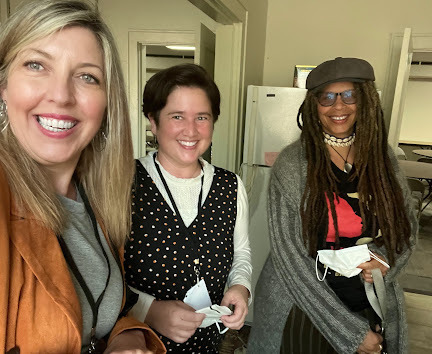 Me, Laura Da', and Jourdan Keith!
Me, Laura Da', and Jourdan Keith!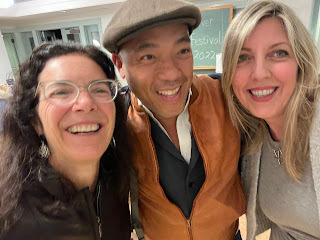 Marty Silano, Roberto Ascalon, me.
Marty Silano, Roberto Ascalon, me.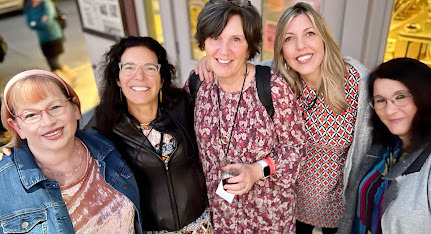 Jeannine Hall Gailey, Marty Silano, Kathleen Flenniken, Susan Rich.
Jeannine Hall Gailey, Marty Silano, Kathleen Flenniken, Susan Rich.Thanks for reading. I hope to be part of #MondayBlogs. Let's see if I can keep this going. Though don't count on it! lol.
~ Kells ________________
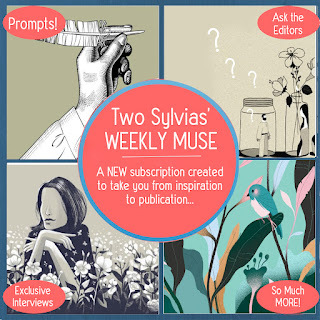
Introducing Two Sylvias' Press Weekly Muse: A weekly subscription of prompts, places to submit, inspiration, and information to help simplify your writing and submitting practice!
www.agodon.com www.twosylviaspress.comKelli Russell Agodonwww.facebook.com/agodonwww.twit...
September 3, 2022
Your Poems Do Matter & Why It's Important To Read Your Poems in Public: A Memoir
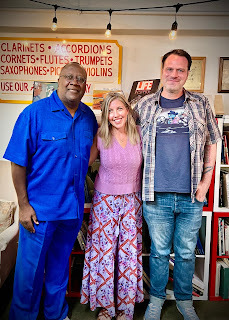 Emmett Wheatfall, Kelli Russell Agodon, & John Sibley Williams at Birdhouse Books, Vancouver, Washington.
Emmett Wheatfall, Kelli Russell Agodon, & John Sibley Williams at Birdhouse Books, Vancouver, Washington. Last night I drove a very long way to give a poetry reading. While I was doing this, the thought crossed my mind, Why am I driving 4-hours to go to a small bookstore to read poetry? I thought, will anyone even be there? Why do I say yes to readings that aren't close to home? I said yes to this reading because I am huge fans of the poets I'm reading with-- John Sibley Williams & Emmett Wheatfalll. So I reminded myself, if no one shows up, at least you've hear some great poems.I arrive to Birdhouse Books which is the coolest bookstore run by the nicest people Sara and Lucas. They have artwork of poets all over the store by poet (and artist) Scott Poole. The bookstore was a full-house of engaged audience members and packed.We decide to do a "braided" reading or what I call a "living anthology" where one poet reads, the second follows, then the third and so on. It's a great way to create energy in a reading and you can't have a "set" playlist because you end up responding to what one poet read with one of your own poems. Which is what happened. John read a poem and talked about his kid, which made me read a poem I wrote to my non-binary kid called "Love Poem Where Nature is Non-Binary & Uses They/Them Pronouns." I was not planning on reading this poem tonight at all—it's not in Dialogues with Rising Tides, so I had to pull it up on my phone from Dropbox.During the reading, I saw one younger human really leaning in and after the reading, they came up to me and said, "You have a non-binary kid, I am a non-binary kid." There are some humans that you run into that you see still move through the world with only love and connection, it's as if all the things that could harm them have bounced off their love force-field. This person was that circle of love.We talked for a bit, they shared their new name, and then they said, "I would like to hug you, may I?" As a mom, when a teenager/preteen asks for a hug, the answer is an absolute yes! (Though actually, I don't think I've ever refused a hug to anyone.) I told them what I believed--that we have so much to learn from non-binary & trans humans who *know* who they are and who are brave enough to speak it and claim it. This beautiful person's mother was there, and she was crying. She said, "We weren't supposed to be here, we dropped in to say hi to the owners then you read your poem and honored my child." We all hugged and I realized immediately that was why I was there--that poem was for them. This was exactly where I needed to be. Poetry readings have a magic to them that I've forgotten after 2 years of no in-person readings. And to think, when I was leaving the house today, I was thinking--this is a long drive for nothing. Understand, we do not know who our poems will touch. Quality over quantity. For me, this was a moment that will always stay with me. Love your humans and support them. This child had a mother who supported their journey and their whole self. And I so appreciate those who honor their non-binary/trans children. I loved how supported this young non-binary human was. I wish all trans/non-binary folx had this love and support--they all should.

 Oh and John & Emmett, were AMAZING! If you ever get a chance to hear these two in person, please go and see them read. They both lead from the heart, with compassion, love, and kindness and truly write and read the most inspiring poems. This was one of the best poetry readings I have ever been to.Anyway, every once in a while I remember what poetry does, it connects us and it makes us feel seen and/or less alone. I am thankful for being reminded of this and for continuing to learn from others in the world as I stumble through my own journey myself.
Oh and John & Emmett, were AMAZING! If you ever get a chance to hear these two in person, please go and see them read. They both lead from the heart, with compassion, love, and kindness and truly write and read the most inspiring poems. This was one of the best poetry readings I have ever been to.Anyway, every once in a while I remember what poetry does, it connects us and it makes us feel seen and/or less alone. I am thankful for being reminded of this and for continuing to learn from others in the world as I stumble through my own journey myself. 
~ Kells________________ www.agodon.com www.twosylviaspress.com
New from Two Sylvias Press: The Weekly Muse--a weekly subscription to help you write more poems, make your writing a priority, as well as to help simplify submitting and publish more poems. Weekly prompts, writing exercises, interviews, inspiration, poetry news, Ask the Editors, an online community and more!
Click here to enjoy a free Weekly Muse here!Kelli Russell Agodonwww.facebook.com/agodonwww.twit...
May 4, 2021
Reading Calendar For Dialogues with Rising Tides / Kelli Russell Agodon
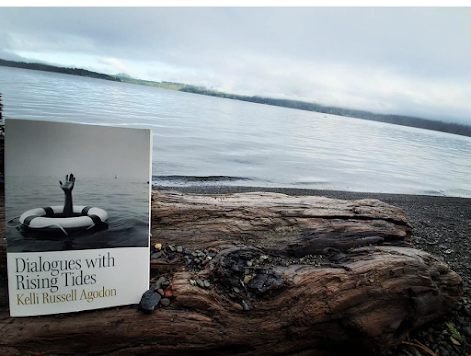
This month I have been dazzled and overjoyed with the love and support from so many about my book, though at times, I have felt like that hand in the life ring on the cover of my book--drowning not waving. Or maybe I'm just looking for a high-five.
I haven't been this busy since pre-pandemic and in the busyness was neglectful of sharing that I have some wonderful readings coming up!
I would love to invite you to my Copper Canyon Press reading tomorrow night (Wednesday, May 5th at 5 pm PST) Click here to get a link to the reading.
The whole event won't be more than an hour, so do join us to hear all these stunning poets and poems from their new books!
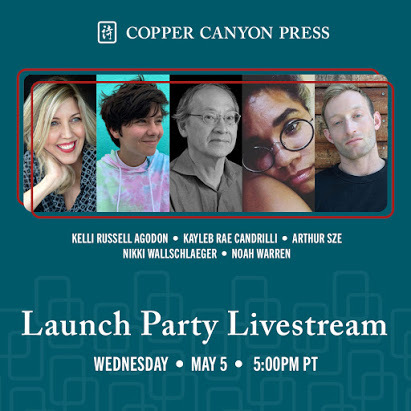
UPCOMING READINGS:
COPPER CANYON RELEASE READING:
May 5th, 2021 (Wednesday), 5 pm PST: Copper Canyon Press Spring Book Release Zoom Reading . with Kayleb Ray Candrill, Arthur Sze, Nikki Wallshlaeger, Noah Warren, and me. Click Here to Sign up for Zoom link.
May 20: Northwind Reading Series with Susan Landgraf.
May 23, 2021 (Sun.): Cultivating Voices LIVE Poetry New Books Showcase Reading Kelli Russell Agodon, Diane Seuss, & Risa Denenberg. (more info to come)
June 2, 2021 (Wed.), 6:30 pm - 8 pm PST: One Page Wednesday Reading Series. Click here for the link to attend.
UPCOMING CLASSES:
September 25, 2021: 10 am - 3 pm PST: The Surrealist Starter Kit: Writing New Poems Based on Surrealists Writing Prompts and Play. via ZOOM
Note: This class is a fundraiser and ALL proceeds from this class is a fundraiser will be donated to the Skagit River Poetry Foundation.
* * * * * * * * * * * * *
Sept. 10-12, 2021: Poets on the Coast: A Online Weekend Writing Retreat for Women, via ZOOM!
~ Kells ________________ www.agodon.com www.twosylviaspress.comKelli Russell Agodon
www.facebook.com/agodon
www.twitter.com/kelliagodon








Reading Calendar For Dialogues with Rising Tides / Kelli Russell Agodon

This month I have been dazzled and overjoyed with the love and support from so many about my book, though at times, I have felt like that hand in the life ring on the cover of my book--drowning not waving. Or maybe I'm just looking for a high-five.
I haven't been this busy since pre-pandemic and in the busyness was neglectful of sharing that I have some wonderful readings coming up!
I would love to invite you to my Copper Canyon Press reading tomorrow night (Wednesday, May 5th at 5 pm PST) Click here to get a link to the reading.
The whole event won't be more than an hour, so do join us to hear all these stunning poets and poems from their new books!

UPCOMING READINGS:
COPPER CANYON RELEASE READING:
May 5th, 2021 (Wednesday), 5 pm PST: Copper Canyon Press Spring Book Release Zoom Reading . with Kayleb Ray Candrill, Arthur Sze, Nikki Wallshlaeger, Noah Warren, and me. Click Here to Sign up for Zoom link.
May 20: Northwind Reading Series with Susan Landgraf.
May 23, 2021 (Sun.): Cultivating Voices LIVE Poetry New Books Showcase Reading Kelli Russell Agodon, Diane Seuss, & Risa Denenberg. (more info to come)
June 2, 2021 (Wed.), 6:30 pm - 8 pm PST: One Page Wednesday Reading Series. Click here for the link to attend.
UPCOMING CLASSES:
September 25, 2021: 10 am - 3 pm PST: The Surrealist Starter Kit: Writing New Poems Based on Surrealists Writing Prompts and Play. via ZOOM
Note: This class is a fundraiser and ALL proceeds from this class is a fundraiser will be donated to the Skagit River Poetry Foundation.
* * * * * * * * * * * * *
Sept. 10-12, 2021: Poets on the Coast: A Online Weekend Writing Retreat for Women, via ZOOM!
~ Kells ________________ www.agodon.com www.twosylviaspress.comKelli Russell Agodonwww.facebook.com/agodonwww.twit...
February 14, 2021
Happy Valentine's Day, Friends!
 As you know, I have a fondness for typewriters. And while I don't own this beauty, it's an Italian designed typewriter called "Valentine" from Olivetti in 1969. What I love is that they put this in the user guide: Dear Valentine, this is to tell you that you are my friend as well as my Valentine, and that I intend to write you lots of letters...
As you know, I have a fondness for typewriters. And while I don't own this beauty, it's an Italian designed typewriter called "Valentine" from Olivetti in 1969. What I love is that they put this in the user guide: Dear Valentine, this is to tell you that you are my friend as well as my Valentine, and that I intend to write you lots of letters...Which brought to mind one of my favorite poems by Agha Shahid Ali, "Stationery."
_________________________________
Stationery
by Agha Shahid Ali
The moon did not become the sun.
It just fell on the desert
in great sheets, reams
of silver handmade by you.
The night is your cottage industry now,
the day is your brisk emporium.
The world is full of paper.
Write to me.
_________________________________
If there is a silver lining to what we've been living through this last year, I hope that's it's given you more time to write more letters, read more, and write more poems.
Sending you Valentines wishes from a very snowy Pacific Northwest,
xo,
Kelli
Poetry Stuff:
You can now preorder Dialogues with Rising Tides from Copper Canyon Press (available April 2021!)
Class: The Surrealists' Toolbox: Generating New Poems from the Subconscious, Saturday, May 1, 2021 from 10 am - 2:30 am PST with Kelli & Susan Rich
Two Sylvias Press Chapbook Prize (17 - 24 page of poems) is now open! Judge: Victoria Chang
_____________
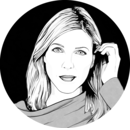 Kelli Russell Agodon
Kelli Russell Agodon Poet/Writer/Editor, Two Sylvias Press kelli@agodon.com Website: www.agodon.com
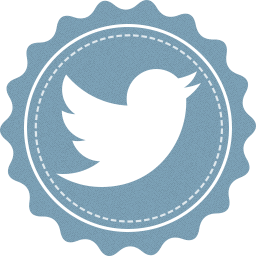



~ Kells ________________ www.agodon.com www.twosylviaspress.comKelli Russell Agodon
www.facebook.com/agodon
www.twitter.com/kelliagodon








Happy Valentine's Day, Friends!
 As you know, I have a fondness for typewriters. And while I don't own this beauty, it's an Italian designed typewriter called "Valentine" from Olivetti in 1969. What I love is that they put this in the user guide: Dear Valentine, this is to tell you that you are my friend as well as my Valentine, and that I intend to write you lots of letters...
As you know, I have a fondness for typewriters. And while I don't own this beauty, it's an Italian designed typewriter called "Valentine" from Olivetti in 1969. What I love is that they put this in the user guide: Dear Valentine, this is to tell you that you are my friend as well as my Valentine, and that I intend to write you lots of letters...Which brought to mind one of my favorite poems by Agha Shahid Ali, "Stationery."
_________________________________
Stationery
by Agha Shahid Ali
The moon did not become the sun.
It just fell on the desert
in great sheets, reams
of silver handmade by you.
The night is your cottage industry now,
the day is your brisk emporium.
The world is full of paper.
Write to me.
_________________________________
If there is a silver lining to what we've been living through this last year, I hope that's it's given you more time to write more letters, read more, and write more poems.
Sending you Valentines wishes from a very snowy Pacific Northwest,
xo,
Kelli
Poetry Stuff:
You can now preorder Dialogues with Rising Tides from Copper Canyon Press (available April 2021!)
Class: The Surrealists' Toolbox: Generating New Poems from the Subconscious, Saturday, May 1, 2021 from 10 am - 2:30 am PST with Kelli & Susan Rich
Two Sylvias Press Chapbook Prize (17 - 24 page of poems) is now open! Judge: Victoria Chang
_____________
 Kelli Russell Agodon
Kelli Russell Agodon Poet/Writer/Editor, Two Sylvias Press kelli@agodon.com Website: www.agodon.com




~ Kells ________________ www.agodon.com www.twosylviaspress.comKelli Russell Agodonwww.facebook.com/agodonwww.twit...
February 8, 2021
Thoughts on Putting Together a Poetry Manuscript
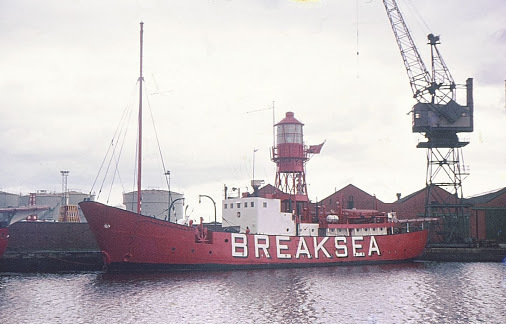
I have spent a lot of time the past three days Zooming with Susan Rich as we prepare for our class on putting together (and publishing) a poetry manuscript--and let's just say, there is a lot to cover!
In 2016, we started writing a book, Demystifying the Manuscript, where we talk about how to put together a poetry manuscript and I believe the first thing we learned and agreed on is: There is no one way to put together a book.
Putting together a manuscript really requires each poet to go deep inside themselves and determine their own vision for the book. For me, it comes down to--what am I trying to share with the reader and what is the best way to do it?
Of course, we're going to share different strategies of ordering and organizing from chronological to narrative arcs to about 7 or 8 other different ways one can order their manuscript! As well as tips we've learned around the way--and I'm truly excited to hear from our special guest poets--Diane Seuss and January Gill O'Neil who will be discussing their process! But there are many ways to order...
My second manuscript, Letters from the Emily Dickinson Room, was alphabetical by title. Because I wanted certain poems to appear earlier in the collection, this constraint of alphabetizing made me have to be more inventive with my titles, which ultimately strengthened my books. (One of these blog posts, I'm going to have to talk about constraints in our work as I feel it's one of the most powerful tools for artists, poets, and writers for inventiveness, imagination, and getting out of our own ways...)
But back to this manuscript stuff, my new book (which is currently heading to the printers as I type this!), Dialogues with Rising Tides is in sections, and it's the most sections I've ever had in a book. Seven! 7 freakin' sections! I would have never thought I'd write a book full of sections, but I realized for this book, for me to weave together the different themes (environmental collapse, suicide, relationships, love/desire, melancholy, anxiety, cruel politics), I needed the reader to have more pauses in the book so they could have space to take it all in.
Because the ocean plays such a big role in my book, my section titles are named after lightvessels (also called lightships). These are huge ships that act as floating lighthouses to keep people away from hazards. There's a section called Break Sea (ways the world tries to break us), Black Deep (lots of melancholy themed poems in here), Shambles (poems about America and getting an IUD during 45s inauguration!) My hope was also the poems would be lightvessels for readers--even while they explore some tougher subjects.
For me, at some point in the creating of the book, there is clarity of what I'm trying to do. Sometimes it takes a long time to understand it. My last book came out in 2014. This book went through a lot of outfits and names. And while I think it can be useful to ask others about your manuscript because sometimes we can't see our own blindspots--for example, a poet forgetting that we don't know the backstory and sometimes we need a bit more so we're not lost--I also think we need to trust our greater vision for the book and develop a strong level of taste (by reading and reading and reading) but also of craft--revise, but kill the spark.
If I can compare this process it's like blowing glass, getting it just right, but something things break and crash through the floor. Thankfully with poetry, there is less mess to clean up. And our biggest hazards are papercuts...
Wishing you all the best on your own future books,
~ Kells ________________ www.agodon.com www.twosylviaspress.comKelli Russell Agodon
www.facebook.com/agodon
www.twitter.com/kelliagodon








Thoughts on Putting Together a Poetry Manuscript

I have spent a lot of time the past three days Zooming with Susan Rich as we prepare for our class on putting together (and publishing) a poetry manuscript--and let's just say, there is a lot to cover!
In 2016, we started writing a book, Demystifying the Manuscript, where we talk about how to put together a poetry manuscript and I believe the first thing we learned and agreed on is: There is no one way to put together a book.
Putting together a manuscript really requires each poet to go deep inside themselves and determine their own vision for the book. For me, it comes down to--what am I trying to share with the reader and what is the best way to do it?
Of course, we're going to share different strategies of ordering and organizing from chronological to narrative arcs to about 7 or 8 other different ways one can order their manuscript! As well as tips we've learned around the way--and I'm truly excited to hear from our special guest poets--Diane Seuss and January Gill O'Neil who will be discussing their process! But there are many ways to order...
My second manuscript, Letters from the Emily Dickinson Room, was alphabetical by title. Because I wanted certain poems to appear earlier in the collection, this constraint of alphabetizing made me have to be more inventive with my titles, which ultimately strengthened my books. (One of these blog posts, I'm going to have to talk about constraints in our work as I feel it's one of the most powerful tools for artists, poets, and writers for inventiveness, imagination, and getting out of our own ways...)
But back to this manuscript stuff, my new book (which is currently heading to the printers as I type this!), Dialogues with Rising Tides is in sections, and it's the most sections I've ever had in a book. Seven! 7 freakin' sections! I would have never thought I'd write a book full of sections, but I realized for this book, for me to weave together the different themes (environmental collapse, suicide, relationships, love/desire, melancholy, anxiety, cruel politics), I needed the reader to have more pauses in the book so they could have space to take it all in.
Because the ocean plays such a big role in my book, my section titles are named after lightvessels (also called lightships). These are huge ships that act as floating lighthouses to keep people away from hazards. There's a section called Break Sea (ways the world tries to break us), Black Deep (lots of melancholy themed poems in here), Shambles (poems about America and getting an IUD during 45s inauguration!) My hope was also the poems would be lightvessels for readers--even while they explore some tougher subjects.
For me, at some point in the creating of the book, there is clarity of what I'm trying to do. Sometimes it takes a long time to understand it. My last book came out in 2014. This book went through a lot of outfits and names. And while I think it can be useful to ask others about your manuscript because sometimes we can't see our own blindspots--for example, a poet forgetting that we don't know the backstory and sometimes we need a bit more so we're not lost--I also think we need to trust our greater vision for the book and develop a strong level of taste (by reading and reading and reading) but also of craft--revise, but kill the spark.
If I can compare this process it's like blowing glass, getting it just right, but something things break and crash through the floor. Thankfully with poetry, there is less mess to clean up. And our biggest hazards are papercuts...
Wishing you all the best on your own future books,
~ Kells ________________ www.agodon.com www.twosylviaspress.comKelli Russell Agodonwww.facebook.com/agodonwww.twit...



